|

I
have to say that when I heard Dave Keller had
signed with Catfood Records, the news put a
little hop in my step. The Vermont resident is
one of my favorite soul and blues vocalists and
the El Paso-based record label has released some
of the most memorable soul-blues recordings in
recent years, so I’ve been eagerly awaiting
their first collaboration. Every Soul’s A Star
doesn’t disappoint in the least with Keller
turning in a powerful set of ten original songs,
along with one choice cover.
Production is in the capable hands of Jim
Gaines, and Keller gets stellar backing from
Catfood’s “House Band,” the Rays, which include
label head Bob Trenchard on bass, legendary
Motown/LTD guitarist Johnny McGhee, keyboardist
Dan Ferguson, drummer Richy Puga, a horn section
of Mike Middleton (trumpet) and Nick Flood
(tenor/baritone sax), percussionist Christopher
Serrano, and backing vocalists Janelle Thompson
and Shakara Watson.
The
opener “Don’t Let Them Take Your Joy” offers
words of encouragement for those facing hard
times and oppression, and the exuberant title
track reminds listeners that every individual
has something of worth to contribute to society,
a message that all need to heed these days. The
album’s lone cover is next, a delicious cover of
“Baby, I Love You,” a tribute to the late Aretha
Franklin, who made the Ronnie Shannon
composition a hit in the late ’60s, followed by
the Memphis soul of “Old Tricks,” where Keller
finds himself being fooled by his lover’s lies
once again.
“You
Bring The Sunshine” is a solid ballad that
really brings the classic soul sound back to
life, with assistance from Ferguson’s keyboards
and the horn section, and “Freedom Is Ours”
takes a look at current issues affecting the
world including slavery and immigration while
the tender “This Is Gonna Hurt” finds Keller
ending a relationship as gently as he can. “It’s
All In Your Eyes” is one of the best songs on
the disc, which is really saying something. It
features great lyrics from Keller, a sweet
guitar solo, and a light and soulful groove.
The
funky “Kiss Me Like You Miss Me” has a greasy
Memphis flair, and the slow burning ballad “When
Are You Gonna Cry?” is a perfect vehicle for
Keller, who really stretches out vocally on this
one. The fiery and defiant “Ain’t Givin’ In”
closes the disc in fine fashion.
Every Soul’s A Star is one satisfying serving of
blues and soul. One of Keller’s mentors, Johnny
Rawls, introduced the singer to Trenchard five
years ago at the BMAs which helped pave the
way for this most excellent collaboration. Blues
and soul fans owe Mr. Rawls a debt of gratitude
for getting the ball rolling. Hopefully, this
relationship will last a long time.
--- Graham Clarke
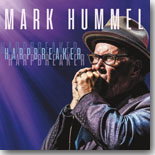 Mark
Hummel has been playing harmonica since 1970 and
is considered one of the modern masters of the
instrument. He’s appeared on some 30 recordings
since the mid-’80s and earned a Grammy
nomination for his contributions to the 2013
release Remembering Little Walter, which won two BMA’s in 2014. He’s started Mark Hummel’s Blues
Harmonica Blowout in 1991, which has featured
every harmonica legend still drawing breath as
well as many up-and-comers. Mark
Hummel has been playing harmonica since 1970 and
is considered one of the modern masters of the
instrument. He’s appeared on some 30 recordings
since the mid-’80s and earned a Grammy
nomination for his contributions to the 2013
release Remembering Little Walter, which won two BMA’s in 2014. He’s started Mark Hummel’s Blues
Harmonica Blowout in 1991, which has featured
every harmonica legend still drawing breath as
well as many up-and-comers.
Hummel’s recent release, Harpbreaker (Electro-Fi
Records), is that rarest of rarities, an
all-instrumental blues harmonica showcase that
features 13 outstanding tracks recorded between
2004 and 2018 at various studios and venues,
featuring an all-star line-up of musicians
providing support, including guitarists Rusty
Zinn, Mel Brown, Billy Flynn, Charlie Baty,
Anson Funderburgh, Kid Andersen, and Charles
Wheal.
Little Walter’s influence on Hummel’s style can
be heard on several tracks --- the energetic “Harpoventilatin’”
that kicks off the disc, recorded live at
Yoshis’s in Oakland in 2005, Muddy Waters’
“Evans Shuffle” and “Ready, Steady, Stroll,’
both recorded with Zinn on guitar, and an
exuberant take on the harmonica legend’s own
“Crazy Legs.” The swinging “Rotten Kid” is a
live track from 2004 written by jazz drummer
Buddy Rich and features Brown on guitar. This
track, along with Horace Silver’s “Senor Blues”
and the funky shuffle “Glide On” show Hummel’s
versatility in a jazzy setting.
Guitarist Flynn spices things up on “Billy’s
Boogaloo,” one of the newer tracks, written by
Hummel and recorded at Greaseland. The other new
track is Baby Boy Warren’s boogie burner “Chuckaluck.”
Lee Allen’s ’50s classic “Walkin’ With Mr Lee”
features Hummel with the Golden State Lone Star
Blues Revue (Baty, Funderburgh, drummer Wes
Starr and bassist RW Grisby). Hummel also pays
tribute to Charlie Musselwhite with a splendid
version of “Christo Redentor” and closes the
disc with a fine take on another blues standard,
“See See Rider,” accompanied only by Zinn’s
guitar.
Most
of the tracks included on Harpbreaker are
previously unreleased, which will be a treat to
his fans. There’s a lot of great music to savor
on this album. If you’re a fan of the harmonica,
this is an album you should own. If you’re not a
fan, you should become one after listening.
--- Graham Clarke
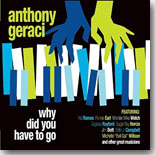 In
2016, Anthony Geraci received BMA nominations
for Album, Traditional Album, and Song of the
Year for his 2015 release, Fifty Shades of
Blues. He’d previously been part of 40 other
nominations as a member of Sugar Ray Norcia and
the Bluetones, and also was a charter member of
Ronnie Earl’s Broadcasters. He has played with
scores of blues artists, including Big Walter
Horton, Big Jack Johnson, Odetta, Snooky Pryor,
Duke Robillard, Debbie Davies, and most recently
with the blues supergroup The Proven Ones. In
2016, Anthony Geraci received BMA nominations
for Album, Traditional Album, and Song of the
Year for his 2015 release, Fifty Shades of
Blues. He’d previously been part of 40 other
nominations as a member of Sugar Ray Norcia and
the Bluetones, and also was a charter member of
Ronnie Earl’s Broadcasters. He has played with
scores of blues artists, including Big Walter
Horton, Big Jack Johnson, Odetta, Snooky Pryor,
Duke Robillard, Debbie Davies, and most recently
with the blues supergroup The Proven Ones.
Geraci’s latest release, Why Did You Have To Go
(Shining Stone Records), follows the same path
as its predecessor, with Geraci enlisting a host
of guest vocalists and musicians on 13
original compositions. The lineup of musicians
includes guitarists Kid Ramos, Monster Mike
Welch, Ronnie Earl, and Troy Gonyea, bassists
Michael “Mudcat” Ward and Willie J. Campbell,
drummers Jimi Bott, Neal Gouvin, and Marty
Richards, with Gordon Beadle (sax) and Doug
Woolverton (trumpet).
Several tracks feature Geraci with Sugar Ray and
the Blue Tones, which is never a bad thing at
all with the charismatic Norcia behind the mic
on the title track, a slow burner which also
features stinging lead guitar from Welch and
horns, the uptempo shuffle “Time’s Running Out,”
which features Earl on lead guitar, and the
ballad “My Last Goodbye,” a nine-minute classic
with extended solos from Earl, Geraci, and
Norcia.
Sugaray Rayford handles vocals on the
Texas-styled shuffle “Don’t The Grass Look
Greener,” backed by Ramos and Welch on guitars
with Bott and Campbell manning the rhythm
section with Geraci, “Angelina, Angelina,” a
stylish slow blues, and the New Orleans R&B romp
“Long Way Home.” Michelle “Evil Gal” Willson
appears on two tracks, the jazz-flavored “Two
Steps Away From The Blues” and “What About Me,”
a ballad duet with Brian Templeton of the Radio
Kings.
Texas blues man Willie J. Laws takes the mic for
the roadhouse rocker “Fly On The Wall” and
“Baptized In The River Yazoo,” a powerful track
teaming Laws’ testifying vocals with Geraci’s
piano accompaniment. Dennis Brennan also
sings on two tracks, the bawdy barrelhouse “Too
Many Bad Decisions” and the rollicking “Hand
Over Your Walking Shoes.”
Geraci is a solid, anchoring presence throughout
the disc, playing in a variety of styles and
stepping forward for the occasional solo, but
always providing excellent support. The closing
instrumental, “A Minor, Affair,” is a sterling
mixture of jazz and the blues, and Geraci really
takes center stage on this track with excellent
support from Ramos, Gonyea, Bott, Campbell,
Woolverton, and Beadle.
Why
Did You Have To Go is a wonderful collection of
songs that feature a satisfyingly diverse range
of blues styles. Any self-respecting blues fan
would love to have this album in their
collection.
--- Graham Clarke
 Baton Rouge-based singer/guitarist/songwriter
Jonathon Long got his musical start singing
gospel as a child, but as a teenager he played
the blues with Henry Gray, Larry Garner, Kenny
Neal and a pair of Slim Harpo’s alums, James
Johnson and Rudy Richard, dropping out of school
at age 14 to tour with reggae/funk musician
Henry Turner Jr. Previously recording as
Jonathon “Boogie” Long, Long drops the “Boogie”
with Jonathon Long, his latest release, which is
produced by Samantha Fish on her brand new
label, Wild Heart Records, and branches out a
bit in his musical direction. Baton Rouge-based singer/guitarist/songwriter
Jonathon Long got his musical start singing
gospel as a child, but as a teenager he played
the blues with Henry Gray, Larry Garner, Kenny
Neal and a pair of Slim Harpo’s alums, James
Johnson and Rudy Richard, dropping out of school
at age 14 to tour with reggae/funk musician
Henry Turner Jr. Previously recording as
Jonathon “Boogie” Long, Long drops the “Boogie”
with Jonathon Long, his latest release, which is
produced by Samantha Fish on her brand new
label, Wild Heart Records, and branches out a
bit in his musical direction.
Long
wrote 10 of the 11, the opener, “Bury Me,” is a
tight, anthemic Southern-rocker reflecting on
the struggles of ordinary folks with a driving
beat and powerful guitar work from Long and
Fish. “Shine Your Love” sounds like a
great fit on the country charts. “That’s When I
Knew” strikes a greasy Memphis groove and the
soul really comes out in Long’s voice on this
track. The acoustic “The Light” leans toward
country and Americana, and “Living The Blues”
shows that there’s a pretty thin line between
country and the blues.
The
upbeat rocker “Natural Girl” ventures in the
Southern rock territory again. “The River,”
written by Kenny Tudrick, is an atmospheric
ballad that teams Long and Fish both vocally and
on guitar, and “Pour Another Drink” is a jaunty
swagger with a Crescent City feel with Long’s
boozy vocal backed by Phil Breen’s keyboards
(Breen’s not listed on album credits, but a
major factor on most of the album). “This Road”
rocks with an Allman-esque vibe, courtesy of
Long’s sizzling slide guitar, and “Where Love
Went Wrong” is jazzy R&B, while “Pray For Me” is
a hard-charging blues rocker that closes the
disc.
Jonathon Long, both the album and the artist,
offers blues fans a tasty mix of blues, rock,
and soul with a decidedly Southern flavor. Long
is a definite triple threat with his personal
and honest songwriting, formidable guitar chops,
and an amazing set of pipes that crosses genres
seamlessly.
--- Graham Clarke
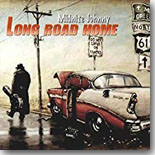 Midnite Johnny, a.k.a. John Morana, has built a
pretty impressive résumé over the past few
decades, establishing a reputation as one of
South Florida’s most powerful blues guitarists
while working with Harvey Mandel of Canned Heat,
Thom Doucette (Allman Brothers Band), Warren
Caesar, and South Florida favorites Kilmo & the
Killers, a band which toured frequently
throughout the U.S. in the early ’90s. Midnite Johnny, a.k.a. John Morana, has built a
pretty impressive résumé over the past few
decades, establishing a reputation as one of
South Florida’s most powerful blues guitarists
while working with Harvey Mandel of Canned Heat,
Thom Doucette (Allman Brothers Band), Warren
Caesar, and South Florida favorites Kilmo & the
Killers, a band which toured frequently
throughout the U.S. in the early ’90s.
Now
based in the U.K., the Midnite Johnny Band (Morana
– lead guitars/slide guitars/acoustic
guitars/vocals, Steve Zoyes – B3/piano, John
Grillo – drums, Serdio Cazzo – bass, Stan Walman
– sax, Arlene Coutee – backing vocals, Yoel
Hyman – synth brass) has built a dedicated
following throughout Europe with their versatile
mix of blues, R&B, and roots rock. The band’s
latest release, on Mosher Street Records, is
Long Road Home.
Of
the 15 tracks, Morana and/or Zoyes wrote 11.
There’s an acoustic and electric version of the
title track. The electric is a fierce rocker in
the “Rollin’ and Tumblin’” mode with some fierce
slide guitar from Morana, while the acoustic
version, which closes the album, features a
string section and has a southern rock feel. The
album opener, “Your New Occupation,” is a
boisterous blues rocker, and “Slow Burn Inside”
is indeed a slow burner with rock-edged guitar.
The
cool Latin-flavored “Tired of Foolin’ Around”
features some splendid slide guitar and nice
work on the keys from Zoyes, and the smooth
urban shuffle “All The Blues” includes a superb
sax solo from Waldman, while Morana really does
a fine job on guitar and vocals on the ballad,
“Motels, Whisky & Me.” “Betcha By Now” throws a
little funk into the mix, the mid-tempo “Heard
That One Before” is a different look at a dying
relationship, and the mellow “Outta Time” and
“That’s All You Gonna Get” both have a bit of a
pop flair.
The
band also includes three covers. The first is an
upbeat read of J.J. Cale’s “Crazy Mama,” spiced
up by Morana’s slide guitar. The second is
Mandel’s “Baby Batter,” a wonderful instrumental
that veers from jazz to funk to rock to blues
and gives Morana plenty of space to display his
guitar chops. The final cover is an old-school
acoustic interpretation of the blues standard
“Key To The Highway.”
Blues rock fans can’t go wrong with Midnite
Johnny’s latest. Long Road Home includes some
fine original tunes, imaginative guitar work
from Morana, and solid musicianship throughout.
--- Graham Clarke
 California singer/songwriter/guitarist
Dennis
Herrera recently released his third album,
You
Stole My Heart (DAS Entertainment), a glorious
mix of blues, rock, and soul. Produced by
Herrera with Rick Wenzel, with portions recorded
in Northern California at Kid Andersen’s Greaseland Studios in San Jose and in Southern
California by Wenzel at Ardent Audio Productions
in Torrence. For blues fans who are unfamiliar
with Herrera, he’s a talented guitarist and
singer, and his songwriting and overall musical
approach has a laidback swinging feel that pulls
listeners in. California singer/songwriter/guitarist
Dennis
Herrera recently released his third album,
You
Stole My Heart (DAS Entertainment), a glorious
mix of blues, rock, and soul. Produced by
Herrera with Rick Wenzel, with portions recorded
in Northern California at Kid Andersen’s Greaseland Studios in San Jose and in Southern
California by Wenzel at Ardent Audio Productions
in Torrence. For blues fans who are unfamiliar
with Herrera, he’s a talented guitarist and
singer, and his songwriting and overall musical
approach has a laidback swinging feel that pulls
listeners in.
The
title track, a rock n’ roller that pays tribute
to Herrera’s wife, Denise, opens the disc and
features pianist Sid Morris and sax man Jack
Sanford. “Takes Money” is a driving blues rocker
with Denis Depoitre on harmonica and Wenzel on
B3, and “Fore” is a funky, midtempo
self-depreciating look at Herrera’s golf game,
which is followed by the West Coast shuffle “No
Refrain.” Sanford channels Jr. Walker on “Look
Out” which has a soul/R&B feel and reflects on
growing old, and the jazz-flavored “Recovery”
finds Herrera somberly reflecting on his early
struggles with hard living and bad decisions.
“You
Can Name It” is a “cool” instrumental shuffle in
the tradition of the Iceman, Albert Collins, and
Wenzel’s B3 and Sanford’s sax really complement
Herrera’s stinging lead guitar. The turmoil
associated with rush hour traffic is the topic
of “Backed-Up,” a Windy City shuffle, and “My
Past Time” is a tasty slow blues burner. “Run
With The Losers” is a sharp roadhouse rocker,
and the closer, “Bittersweet,” is a solo
acoustic number about a pair of lovers who
“sometimes just don’t see eye to eye.”
Herrera’s amiable vocals are a great fit for his
songwriting, which takes a wry look at issues
that regular folks have to deal with. Listeners
will relate to all of his songs in a big way.
Another strong point of the album is the
excellent musicianship of Herrera and both
backing bands (Morris – piano, Sanford – sax,
Frank DeRose – bass, and Robi Bean – drums, for
the NorCal sessions, and Depoitre – harp, Lee
Campbell – drums, Bill Stuve – bass, Jeff
Jorgenson – sax, Gordon Peeke – percussion, and
Wenzel – keys, for the SoCal sessions).
You
Stole My Heart is a fine release from an
underrated West Coast bluesman who sounds like
he loves what he’s doing. Chances are very good
that you will like what Dennis Herrera is doing,
too.
--- Graham Clarke
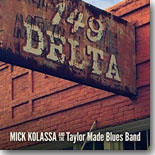 Mick
Kolassa is back with another wonderful album of
his “Free Range Blues” with The Taylor Made
Blues Band (David Dunavent – guitar, Leo Goff –
bass, Lee Williams – drums, Chris Stephenson –
keyboards, with Susan Marshall and Daunielle
Hill – backing vocals). 149 Delta Avenue
(Endless Blues Records) is also chock-full of
special guests in Jeff Jensen and Toronzo Cannon
on guitar, Eric Hughes and J.D. Taylor on
harmonica, Marty Sammon on keyboards, and a horn
section of Marc Franklin (trumpet), Kirk
Smothers (sax), and Suavo Jones (trombone). Mick
Kolassa is back with another wonderful album of
his “Free Range Blues” with The Taylor Made
Blues Band (David Dunavent – guitar, Leo Goff –
bass, Lee Williams – drums, Chris Stephenson –
keyboards, with Susan Marshall and Daunielle
Hill – backing vocals). 149 Delta Avenue
(Endless Blues Records) is also chock-full of
special guests in Jeff Jensen and Toronzo Cannon
on guitar, Eric Hughes and J.D. Taylor on
harmonica, Marty Sammon on keyboards, and a horn
section of Marc Franklin (trumpet), Kirk
Smothers (sax), and Suavo Jones (trombone).
Kolassa kicks things off with the rousing rocker
“I Can’t Slow Down,” a narrative of life on the
road, and “US 12 to Highway 49,” a gutsy blues
shuffle that continues the “life on the road”
theme and features Hughes with some smoking
harmonica. “Alternative Man” is offered in two
different versions. The first version is a slow
burner, and the second, called “Alternative Man
Alternative,” has a rock edge. “Cotton Road”
opens in a field recording setting, with moans
and wails, but slowly develops into a fierce
blues rocker with guitar from Cannon and
haunting backing vocals from Marshall and Hill.
On
the somber “American Intervention,” at first
listen Kolassa appears to be pleading to a
friend to save themselves, but the title and
additional listening indicates that the song has
more serious, political overtones. You be the
judge. Franklin and Smothers break out the horns
for “Pullin’ Me Down,” giving this mid-tempo
track a steady Memphis groove, while Taylor
guests on harmonica for the easygoing blues
“Whiskey In The Mornin’.” Next up is the Ashford
and Simpson R&B classic “I Don’t Need No
Doctor,” and Kolassa keeps the jazzy feel of the
duo’s original version with assistance from
Franklin, Smothers, and Stephenson’s keyboards.
The
second of the album’s three covers is a fun
reading of Larry Garner’s “Miss Boss,” which is
bound to be a crowd pleaser and Kolassa plays it
for what it’s worth. “35 Miles To Empty” is
another tale of the road with more tasty
harmonica backing from Hughes. The closer is
Stuff Smith’s “The Viper,” a funky, jazzy trip
with the horns being augmented by Jones’
trombone and Alice Hasen’s violin.
Mick Kolassa never disappoints. He always gives
blues fans some compelling, entertaining music,
and 149 Delta Avenue is another fine addition to
his catalog.
--- Graham Clarke
 The
Bob Lanza Blues Band’s fifth release, Kids, Dogs
& Krazy Women (Connor Ray Music), finds
Jersey-based guitarist Lanza working with
producer/musician Anthony Kirzan, who’s
previously worked with the Spin Doctors, Lenny
Kravitz, and Noel Redding. Kirzan co-produces
the album with Lanza, and it’s a mix of
originals and covers played in the rugged
roadhouse style that Lanza is noted for. Joining
Lanza (guitar/vocals) and Kirzan
(guitar/vocals/drums/percussion) are John Ginty
(B3/piano), Vin Mott (drums/harmonica), and Dave
Lockhart (bass). The
Bob Lanza Blues Band’s fifth release, Kids, Dogs
& Krazy Women (Connor Ray Music), finds
Jersey-based guitarist Lanza working with
producer/musician Anthony Kirzan, who’s
previously worked with the Spin Doctors, Lenny
Kravitz, and Noel Redding. Kirzan co-produces
the album with Lanza, and it’s a mix of
originals and covers played in the rugged
roadhouse style that Lanza is noted for. Joining
Lanza (guitar/vocals) and Kirzan
(guitar/vocals/drums/percussion) are John Ginty
(B3/piano), Vin Mott (drums/harmonica), and Dave
Lockhart (bass).
The
title track opens the disc and it has a
crowd-pleasing catchy chorus and some tasty
slide guitar from Kirzan. “Little Momma” is a
rowdy Texas-styled shuffle with Mott cutting
loose on harmonica, while the minor-key ballad
“Not The Man I Used To Be” borrows the familiar
Magic Sam guitar riff, and the Patsy Cline
classic “Walking After Midnight” is transformed
into a swinging blues with great results.
I
first heard Frankie Lee’s “Full Time Lover” when
I saw the Fabulous Thunderbirds perform it live
in the mid-’80s, and Lanza energetic remake
measures up well to either version. “Hey Cotton”
is a fast-paced tribute to the late James
Cotton, who Lanza backed up in his younger days,
and “Problems,” from Little Mike Markowitz, is a
funky swamp blues in the Excello tradition.
Trudy Lynn’s “Every Side of Lonesome” and
Lanza’s “Hey Baby” are both Chicago-styled
shuffles, and the rollicking “Let Me In” is from
the early days of the Fabulous Thunderbirds. The
closer “Raritan” River Stop” is an acoustic
instrumental with slide guitar from Kirzan.
A
sturdy set of old school blues rockers with fine
originals, well-chosen covers, and excellent,
savvy instrumental work, Kids, Dogs & Krazy
Women from The Bob Lanza Band will satisfy any
fan of high-energy blues.
--- Graham Clarke
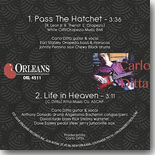 New
Orleans singer/songwriter Carlo Ditta is best
known for his tune, “Pray,” which was voted Best
Gospel Song by the American Song Festival in the
’70s, and which Ditta recorded with Mighty Sam
McClain (a wonderful version can be heard on
McClain’s Live in Japan album). Over the years, Ditta has worked as a songwriter and performer
across the country, but ended up back in the
Crescent City making records for his own Orleans
Records with McClain, Roland Stone, Little
Freddie King, Guitar Slim Jr., Coco Robicheaux,
Rockie Charles, and Ironing Board Sam to name
just a few. New
Orleans singer/songwriter Carlo Ditta is best
known for his tune, “Pray,” which was voted Best
Gospel Song by the American Song Festival in the
’70s, and which Ditta recorded with Mighty Sam
McClain (a wonderful version can be heard on
McClain’s Live in Japan album). Over the years, Ditta has worked as a songwriter and performer
across the country, but ended up back in the
Crescent City making records for his own Orleans
Records with McClain, Roland Stone, Little
Freddie King, Guitar Slim Jr., Coco Robicheaux,
Rockie Charles, and Ironing Board Sam to name
just a few.
Recently, Ditta released his own 45 on Orleans;
The A-side is the New Orleans R&B standard “Pass
The Hatchet,” a gloriously funky slice of
Crescent City featuring Ditta’s gravelly,
soulful vocals and a delightfully funky
arrangement with Ditta on guitar, Earl Stanley
Oropeza on bass and maracas, Johnny Pennino on
sax, and Chewy Black on drums (there’s also a
uncredited harmonica player as well). The B-side
is a Ditta composition, “Life In Heaven,” that
has a bit of a ghostly swamp pop vibe with Dave
Easley’s skittering pedal steel. Jerry
Jumonville also plays sax, with Anthony Donado
on drums, Angelamia Bachemin on percussion,
David Hyde on bass, and Rick Stelma on
Wurlitzer.
The
single is available via streaming on the usual
outlets, for paid download, or vinyl at Orleans
Records.
--- Graham Clarke
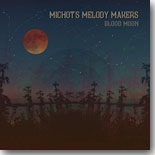 Michot’s Melody Makers is led by fiddler/lead
singer Louis Michot (of Lost Bayou Ramblers),
who is joined on this side project by fellow
Ramblers Bryan Webre (bass/percussion) and
Kirkland Middleton (drums/percussion), as well
as guitarist Mark Bingham. Their debut, Blood
Moon (Sinking City Records), is a collection of
blues and Cajun fiddle tunes with incorporated
drums and amps, along with sampling to give
these traditional tunes a modern sheen. The
results are intriguing and entertaining. Michot’s Melody Makers is led by fiddler/lead
singer Louis Michot (of Lost Bayou Ramblers),
who is joined on this side project by fellow
Ramblers Bryan Webre (bass/percussion) and
Kirkland Middleton (drums/percussion), as well
as guitarist Mark Bingham. Their debut, Blood
Moon (Sinking City Records), is a collection of
blues and Cajun fiddle tunes with incorporated
drums and amps, along with sampling to give
these traditional tunes a modern sheen. The
results are intriguing and entertaining.
The
sampling and enhanced production makes these
selections spring to life. The opener, “Two-Step
de Ste Marie,” has drums that nearly jump out of
your speakers and Michot’s fiddle sounds like it
could burst into flames shortly. Folks will be
dancing to this tune and the next one, the
seriously funky “Grand Marais.” The haunting
“Dans Le Pins” is next, highlighted by Michot’s
mournful fiddle and vocals. The somber mood only
lasts a few minutes, however, because “Allons
Tous Boire Un Coup” picks up the pace again, and
a breakneck pace at that.
The
lively “Blues de Neg Francais” is another
highlight, sounding traditional and modern at
the same time, but “La Lune Est Croche”
definitely has an updated feel, with sampling
and remixing of the drums, fiddle, and triangle
throughout, and “Coyote Sur Les Chemins” is a
Cajun waltz like you’ve never heard. The closer,
“La Danse Carrée,” is a fiddling showcase for
Michot that concludes this excellent disc on the
highest of high notes.
Michot’s Melody Makers and Blood Moon breathe
exciting new life into this wonderful music.
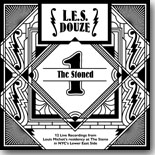 In 2015, Michot was invited by John Zorn to
perform a 12-day musical residency at the
experimental music venue The Stone in NYC, 12
shows in 6 days. Each night Michot played with a
different group, first the bands he’s generally
associated with, then collaborations with
artists like French legend Charlelie Couture,
Leyla McCalla, Pogues vet Spider Stacy’s group
Poguetry, and Pilette’s Ghost, a fiddle/drum
duo. In 2015, Michot was invited by John Zorn to
perform a 12-day musical residency at the
experimental music venue The Stone in NYC, 12
shows in 6 days. Each night Michot played with a
different group, first the bands he’s generally
associated with, then collaborations with
artists like French legend Charlelie Couture,
Leyla McCalla, Pogues vet Spider Stacy’s group
Poguetry, and Pilette’s Ghost, a fiddle/drum
duo.
One
of the sessions was a completely improvised,
nearly 45-minute jam from a group that was
nicknamed The Stoned, consisting of Michot,
Middleton, Webre, with Stacy (tin whistle,
vocals), Ryan Brasseaux (triangle, vocals),
Jason Robira (drums), Jeff Tobias (saxophone),
and Johnny Campos (guitar). It was released as
L.E.S. Douze Volume 1 (Nouveau Electric
Records).
The
track ventures in and out a musical structure,
focusing more on mood, rhythm, and sounds. While
it may not be the ideal selection for one who’s
strictly a blues fan, anyone who digs Miles
Davis (circa In A Silent Way) or maybe Dr.
John’s early ’70s forays into heavy voodoo
funk/R&B, or even the sonic jazz of Sun Ra will
get a charge out of listening. It’s a swampy,
funky, and cosmic experience.
--- Graham Clarke
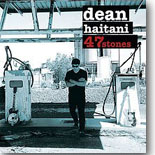 Two items in a brief
one sheet which accompanied Dean Haitani’s CD
review copy of 47 Stones were helpful: “Finger
style” and “experimentation with the
technical.” Sorry to stereotype Australian blues
guitar, but what gets filtered around the world
back to us is usually radical and has to include
distorted slide. We are not disappointed in
either from Haitani. There is a peculiar harmony
throughout this disc sounding like
trumpet/trombone together (undoubtedly a
keyboard sound) making his ensemble style stand
out. In other ways the disc isn’t tremendously
original when it comes to what his website calls
“soul, blues and roots music.” Those words do
however describe his sound. Two items in a brief
one sheet which accompanied Dean Haitani’s CD
review copy of 47 Stones were helpful: “Finger
style” and “experimentation with the
technical.” Sorry to stereotype Australian blues
guitar, but what gets filtered around the world
back to us is usually radical and has to include
distorted slide. We are not disappointed in
either from Haitani. There is a peculiar harmony
throughout this disc sounding like
trumpet/trombone together (undoubtedly a
keyboard sound) making his ensemble style stand
out. In other ways the disc isn’t tremendously
original when it comes to what his website calls
“soul, blues and roots music.” Those words do
however describe his sound.
We have no problem with his lead vocals,
interjection of shuffle rhythms helps with
variety. We like the leadoff track, plus selected
others along the way including one of the
better covers of Little Feat’s "Dixie Chicken."
Why do we need yet another version of "Thrill is
Gone"? How could you in any way improve on the
original? What saves this cover is its tempo,
WAY down and well-controlled. Other slow numbers
get down effectively.
We actually wish there were more guitar and less
keyboards, the latter get too much exposure at
solo time. One track contains three keyboard,
but no guitar, solos. There is a possibility Haitani plays both but unlikely since it’s not
mentioned. Backup personnel and producer are
uncredited, this is his 14th studio album which
indicates considerable experience. Could all his
past releases have been independently produced?
If that is the case he’s got his own sound down.
--- Tom “Hacksaw” Coulson, broadcaster/musician
We also play, hashtag and handle what we review
on the radio:
https://youtu.be/b_UFpph8X70
https://app.box.com/s/23cmnzpjf6ybyfmeyd9o9vcl5qj7s57u
https://app.box.com/s/wlr79116wg59ryfjvb830y7s7899sh44
 She calls her music "punk blues," and she sure
looks the part. But to me Lindsay Beaver's music comes across
as straight-ahead, "balls to the wall"
blues/rock, not for the faint of heart. The
native of Nova Scotia just made her Alligator
recording debut with Tough As Love, and
it's a wild, fun ride. She calls her music "punk blues," and she sure
looks the part. But to me Lindsay Beaver's music comes across
as straight-ahead, "balls to the wall"
blues/rock, not for the faint of heart. The
native of Nova Scotia just made her Alligator
recording debut with Tough As Love, and
it's a wild, fun ride.
Beaver is both the drummer and singer on
Tough As Love, which was recorded in her
adopted hometown of Austin, Texas, and she
excels at both. The other members of her
three-piece band include Brad Stivers on guitar
and Josh Williams on bass, with some mighty
impressive guest artists popping in for cameo
appearances throughout the dozen cuts here.
The
listener finds out right away what Beaver's
music is all about, with the hard-driving,
mid-tempo shuffle, "You're Evil," getting this
session underway. Guest harmonica ace Dennis
Gruenling is as good as always while Stivers
contributes some fiery guitar. Following that
opening cut is Marcia Ball appearing on piano on
the more restrained ballad "Too Cold To Cry.
The
very hot sax work of Sax Gordon highlights the
up-tempo blues "What A Fool You've Been" right
before we get the first cover song with Little
Willie John's "You Hurt Me," a slow blues with
eerie vocals from Beaver, strong guitar chords
by Stivers and more piano from Ball.
Beaver shares vocals with Stivers on the fast
rockabilly number "Don't Be Afraid Of Love"
before moving on to Slim Harpo's "I Got Love If
You Want It." Gruenling is back on harp on the
latter and he does Slim just right. Beaver
certainly has a voice to be an old-style blues
shouter, and we hear her loud and clear on
"Dangerous," with Red Casey sharing blazing
guitar solos with Stivers.
Two
other standout covers include Angela Strehli's
"Lost Cause," a slow blues on which
Beaver's vocals still aren't very subtle, and
Art Neville's "Let's Rock," a mid-tempo New
Orleans rocker that was originally released in
the mid-'50s by Specialty Records.
Beaver again shouts out the vocals on the
closing cut, "Mean To Me," a mid-tempo shuffle
that gives Williams his chance to shine on drums
as well as dueling guitar solos by Stivers and
guest Laura Chavez.
Prepare to be blown away the first time you
listen to this album, perhaps sampling it in
shorter spurts at first so that, like me, you
don't get aurally worn down by the end. But make no mistake --- this is some
solid blues from an emerging artist. Yeah, she
doesn't look the part, but we're now in the 21st
century. Maybe it's time to change some
perceptions
because there's got to be room in the blues
genre for an artist as invigorating as Lindsay
Beaver.
--- Bill Mitchell
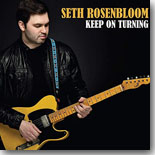 Last
month we introduced our Blues Bytes readers to
teenaged guitar sensation
David Julia, and now we have another young
guitar prodigy in Massachusetts native Seth
Rosenbloom with his first full album, the
self-released Keep On Turning. A product
of the prestigious Berklee College of Music,
Rosenbloom is more than just a guitar slinger,
possessing a fine voice and also showing his
composition skills by writing or co-writing six
of the nine cuts here. The three covers are
well-chosen classics, with Rosenbloom giving his
own take on each song. Last
month we introduced our Blues Bytes readers to
teenaged guitar sensation
David Julia, and now we have another young
guitar prodigy in Massachusetts native Seth
Rosenbloom with his first full album, the
self-released Keep On Turning. A product
of the prestigious Berklee College of Music,
Rosenbloom is more than just a guitar slinger,
possessing a fine voice and also showing his
composition skills by writing or co-writing six
of the nine cuts here. The three covers are
well-chosen classics, with Rosenbloom giving his
own take on each song.
Let's talk first about the cover tunes. It's
obvious from listening to Rosenbloom's guitar
playing that he's been heavily influenced by the
music of B.B. King, so it's only appropriate
that he do one of B.B.'s songs, acquitting
himself well on "Heartbreaker" by capturing that
Lucille sound on his guitar. Trumpet player
Jamelle Aisa and sax man Don Boissy help to take
this one over the top. Elmore James' "Look Over
Yonders Wall" is given more of a funky,
mid-tempo vibe, with the drummer accentuating
the backbeat while Rosenbloom comes in with some
of his strongest vocals on the disc. Rosenbloom
also pumps up his vocals on the Leon Russell
classic, "Palace Of The King," an up-tempo blues
rocker with good work from the horns.
As
for my preferred original numbers, Rosenbloom
starts out the album by showing off his guitar
skills on the slow blues "Keep On Turning." He
later sings about his triumphs over the woman
who left him on the mid-tempo "Crawling Back"
before ripping off a strong guitar solo on the
blues shuffle, "I Can't Help It." Also so
fine is the slow blues, "Right About Now," with
more intricate chording on the guitar and strong
vocals.
Keep On Turning is a fine way to introduce
Rosenbloom to the blues world, so expect to hear
more from this young cat in the future.
--- Bill Mitchell
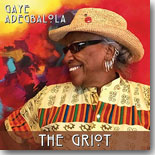 Gaye Adegbalola made
her mark in the blues world nearly 30 years ago
as one of the founding members of Saffire - The
Uppity Blues Woman, appearing on all of their 10
or more albums. She's been just about as
prolific as a solo artist, with her latest being
The Griot
(VizzTone), subtitled "Topical Blues For Topical
Times!" Each of the 17 songs is defined by a
category, for example History Lesson, Hypocrisy,
Pollution, Technology, Old Age, Sex, etc., with
each song tied to one of the categories. Calling
this collection "topical blues" is pretty
accurate, although the latter part of the album
deals more with love and relationships similar
to what we used to hear with Saffire. This album
is really a showcase for Aegbalola's singing,
acoustic guitar playing and songwriting, with
mostly sparse instrumentation from guitarist
Jeff Covert and a few other guests. Gaye Adegbalola made
her mark in the blues world nearly 30 years ago
as one of the founding members of Saffire - The
Uppity Blues Woman, appearing on all of their 10
or more albums. She's been just about as
prolific as a solo artist, with her latest being
The Griot
(VizzTone), subtitled "Topical Blues For Topical
Times!" Each of the 17 songs is defined by a
category, for example History Lesson, Hypocrisy,
Pollution, Technology, Old Age, Sex, etc., with
each song tied to one of the categories. Calling
this collection "topical blues" is pretty
accurate, although the latter part of the album
deals more with love and relationships similar
to what we used to hear with Saffire. This album
is really a showcase for Aegbalola's singing,
acoustic guitar playing and songwriting, with
mostly sparse instrumentation from guitarist
Jeff Covert and a few other guests.
Adegbalola gets right to it on the first cut,
"Nothing's Changed," on which she updates the
historically bad treatment of blacks in America
by adding a stanza about the KKK marching on
Charlottesville. She continually repeats the
chorus, "...Change, change, nothing has
changed."
"Liearrhea"
falls under the Hypocrisy category as she sings
about someone with a bad case of liearrhea who
keeps running off at the mouth and continually
telling mistruths. Nice banjo work here from
Covert. A fuller band joins in on the up-tempo
"(You're) Flint Water," with slide guitar from
Covert and a four-piece horn section. Adegbalola
comments about how her man is dirty and can't be
cleaned, singing "... Polluted like Flint water,
baby, I can't even flush you away ..."
The
Protest category is covered by the up-tempo
blues "Kaepernicked," starting with a few chords
of the National Anthem. We all should know who
Adegbalola is honoring as she sings "...I want
to thank him for taking a knee for me..." and
later adding, "...Oh say can you see, you're
winning the game for me ... You are my new
Muhammad Ali..."
Adegbalola summons her inner "Uppity Blues
Women" persona with a version of Nina Simone's
late night blues "Need a Little Sugar in My
Bowl," featuring nice piano by Roddy Barnes.
Returning for the closing cut, "Jelly Bean
Blues," Barnes also contributes vocals to this
slow blues from the Ma Rainey songbook.
Depending on where you stand on the political
spectrum, you may or may not agree with Ms.
Adegbalola's stands on issues. But there's no
doubting her conviction to go along with some
mighty fine music on The Griot.
--- Bill Mitchell
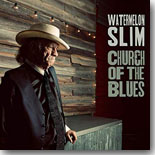 I've avoided reviewing
Watermelon Slim albums
in the past because his vocal style just doesn't
suit my tastes. But the list of guest artists on
Church
Of The Blues (Northern Blues) caught my eye, with distinguished
artists like Bob Margolin, Sherman Holmes, John
Nemeth, Joe Louis Walker, Nick Schnebelen and
Albert Castiglia all appearing, so I thought I'd
give Slim another try. I've avoided reviewing
Watermelon Slim albums
in the past because his vocal style just doesn't
suit my tastes. But the list of guest artists on
Church
Of The Blues (Northern Blues) caught my eye, with distinguished
artists like Bob Margolin, Sherman Holmes, John
Nemeth, Joe Louis Walker, Nick Schnebelen and
Albert Castiglia all appearing, so I thought I'd
give Slim another try.
Watermelon Slim is a fine instrumentalist, both
on slide guitar and harmonica. The best cuts are
the ones on which he turns loose on either
instrument, such as when he shares guitar duties
with Walker on the soulful "Mni Wiconi - The
Water Song," which also features a fine horn
section. Holmes and Nemeth handle the vocals on
the Allen Toussaint cover, "Get Out Of My Life
Woman," with Slim playing a mean slide guitar
and Margolin also joining in. Slim blows some
filthy harp licks on the funky, up-tempo "Me And
My Woman," with Castiglia showing up to handle
guitar duties. I also like Slim's harp playing
on Muddy's "Gypsy Woman."
Despite the fine arrangements and the
outstanding guest performances, I was finished
with the album about three-fourths of the way
through. I just couldn't handle the vocals any
longer.
Your opinion may vary and that's okay. But
it's just not for me.
--- Bill Mitchell |